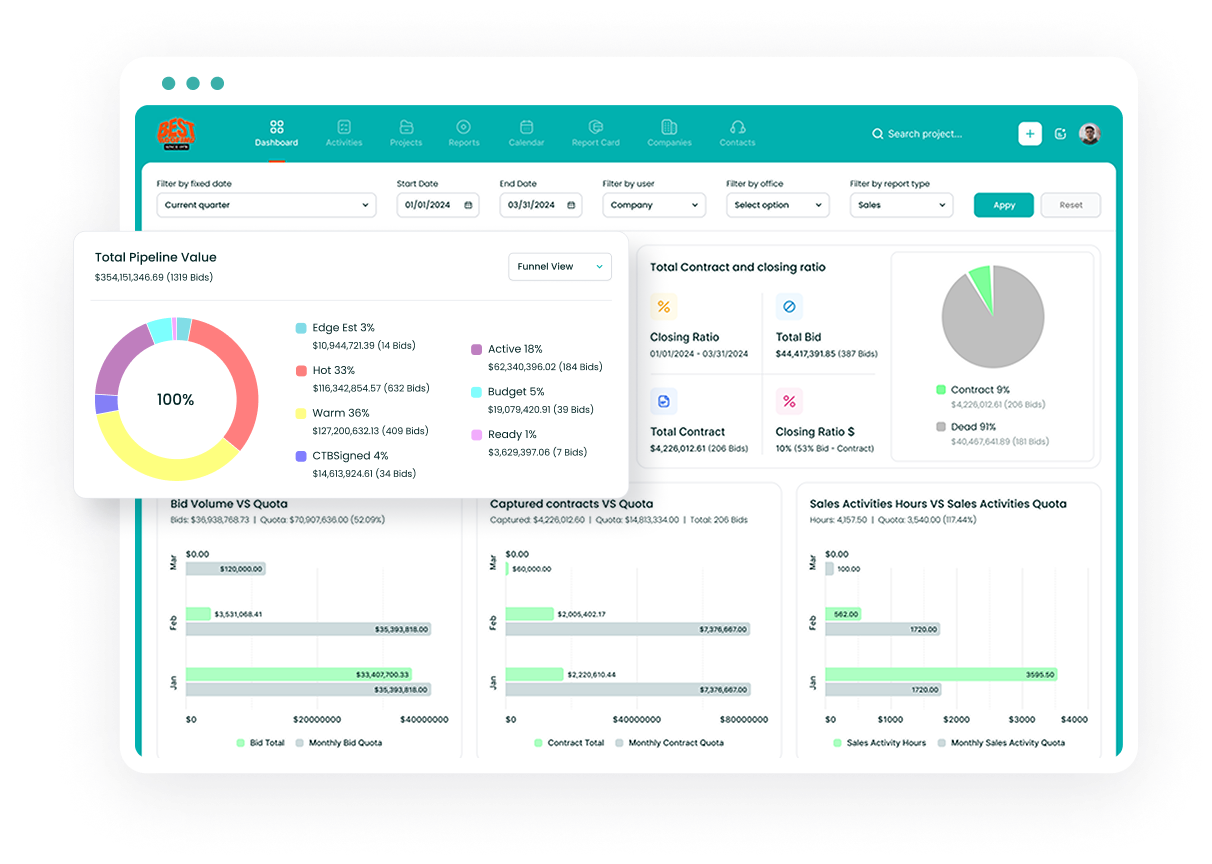Overview
Contractor Foreman is a comprehensive construction management software designed for small to medium-sized contractors. It offers a wide range of features to help manage various aspects of construction projects, from estimating to invoicing.
Procore, on the other hand, is a cloud-based construction management software that aims to connect all stakeholders in a construction project. It offers tools for project management, quality & safety, construction financials, field productivity, and more.
Feature Comparison
Project Management
Contractor Foreman offers basic project management tools, including task management, scheduling, and document storage. It's designed to be user-friendly and accessible for smaller contractors who may not need extremely complex project management features.
Procore provides more advanced project management capabilities, including detailed scheduling, resource allocation, and comprehensive document management. It's designed to handle large, complex projects with multiple stakeholders.
Financial Management
Contractor Foreman includes features for estimating, invoicing, and basic job costing. It's suitable for smaller contractors who need straightforward financial management tools.
Procore offers more sophisticated financial management features, including budget tracking, forecasting, and change order management. It's designed to integrate with various accounting systems and provide detailed financial reporting.
Collaboration Tools
Contractor Foreman provides basic collaboration features, including file sharing and a client portal.
Procore excels in collaboration, offering robust tools for communication between all project stakeholders. It includes features like RFI management, submittal tracking, and real-time document sharing.
Mobile Accessibility
Both platforms offer mobile apps, but Procore is often praised for its robust mobile functionality, allowing users to access and update project information from the field easily.
Customization
Contractor Foreman offers some customization options, but they are generally more limited compared to Procore.
Procore is known for its high level of customizability, allowing users to tailor the platform to their specific needs and workflows.
Ease of Use
Contractor Foreman is often cited as being very user-friendly, with a straightforward interface that's easy for non-technical users to navigate.
Procore is generally considered user-friendly, but due to its more extensive feature set, it can have a steeper learning curve, especially for smaller contractors or those new to construction management software.
Pricing
Pricing is a significant differentiator between these two platforms:
Contractor Foreman offers more transparent and affordable pricing, with plans starting at $49 per month for one user. This makes it more accessible for smaller contractors or those with tighter budgets.
Procore uses a custom pricing model based on the annual construction volume of the company. While exact pricing isn't publicly available, it's known to be significantly more expensive than Contractor Foreman, often starting at several thousand dollars per year.
Customer Support
Both companies prioritize customer support, but their offerings differ. Contractor Foreman provides phone and email support, online resources, and a dedicated implementation coach. Whereas, Procore offers 24/7 phone and email support, extensive online training and certification programs, and a large user community for peer support.
Integration Capabilities
Contractor Foreman offers integration with QuickBooks and a few other tools, but its integration capabilities are more limited compared to Procore.
Procore boasts over 300 integrations with various construction and business software, allowing for a high degree of flexibility and customization.
Target Users
Contractor Foreman is primarily designed for small to medium-sized contractors who need a straightforward, affordable solution for managing their projects and business operations.
Procore is targeted at larger construction companies and general contractors managing complex, large-scale projects. Its extensive feature set and scalability make it suitable for enterprise-level organizations.
User Reviews and Ratings
Contractor Foreman has a rating of 4.5 out of 5 stars based on 652 reviews on Software Advice. Users particularly praise its ease of use, affordability, and customer support.
Procore has a rating of 4.5 out of 5 stars based on 2,717 reviews on Software Advice. Users appreciate its comprehensive feature set, collaboration tools, and ability to manage all aspects of construction projects.
Pros and Cons
Contractor Foreman
Pros:
- Affordable pricing
- User-friendly interface
- Excellent customer support
- Suitable for small to medium-sized contractors
Cons:
- Limited advanced features compared to Procore
- Fewer integration options
- May not be suitable for very large or complex projects
Procore
Pros:
- Comprehensive feature set
- Excellent collaboration tools
- Highly customizable
- Suitable for large, complex projects
Cons:
- Expensive, especially for smaller companies
- Steeper learning curve
- May have more features than necessary for small contractors
Conclusion
Choosing between Contractor Foreman and Procore ultimately depends on your specific needs, budget, and the size and complexity of your projects:
- If you're a small to medium-sized contractor looking for an affordable, user-friendly solution with solid basic features, Contractor Foreman is likely the better choice.
- If you're a larger construction company managing complex, multi-stakeholder projects and need advanced features and extensive customization options, Procore might be more suitable.
Both platforms have their strengths and are well-regarded in the industry. Contractor Foreman excels in providing an accessible, affordable solution for smaller contractors, while Procore offers a more comprehensive, scalable platform for larger organizations and complex projects.
Consider factors such as your budget, the size and complexity of your projects, your need for advanced features, and your team's technical expertise when making your decision. It's also recommended to take advantage of any free trials or demos offered by these platforms to get a firsthand experience before committing.
Remember, the best software is the one that fits your specific workflows and helps your team work more efficiently. Take the time to assess your needs carefully and choose the solution that will best support your construction projects in the long term.
Sources: [1] https://www.procore.com/pricing [2] https://www.softwareadvice.com/construction/contractor-foreman-profile/reviews/ [3] https://www.softwaresuggest.com/contractor-foreman [4] https://www.forbes.com/advisor/business/software/contractor-foreman-review/ [5] https://www.softwareadvice.com/construction/contractor-foreman-profile/ [6] https://www.softwareadvice.com/construction/procore-profile/reviews/ [7] https://www.capterra.ca/reviews/56250/procore [8] https://www.jibble.io/construction-software-reviews/procore [9] https://www.techrepublic.com/article/procore-review/ [10] https://www.trustradius.com/products/procore/reviews?qs=pros-and-cons

